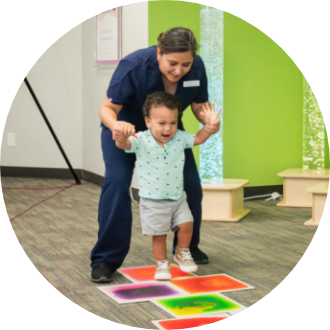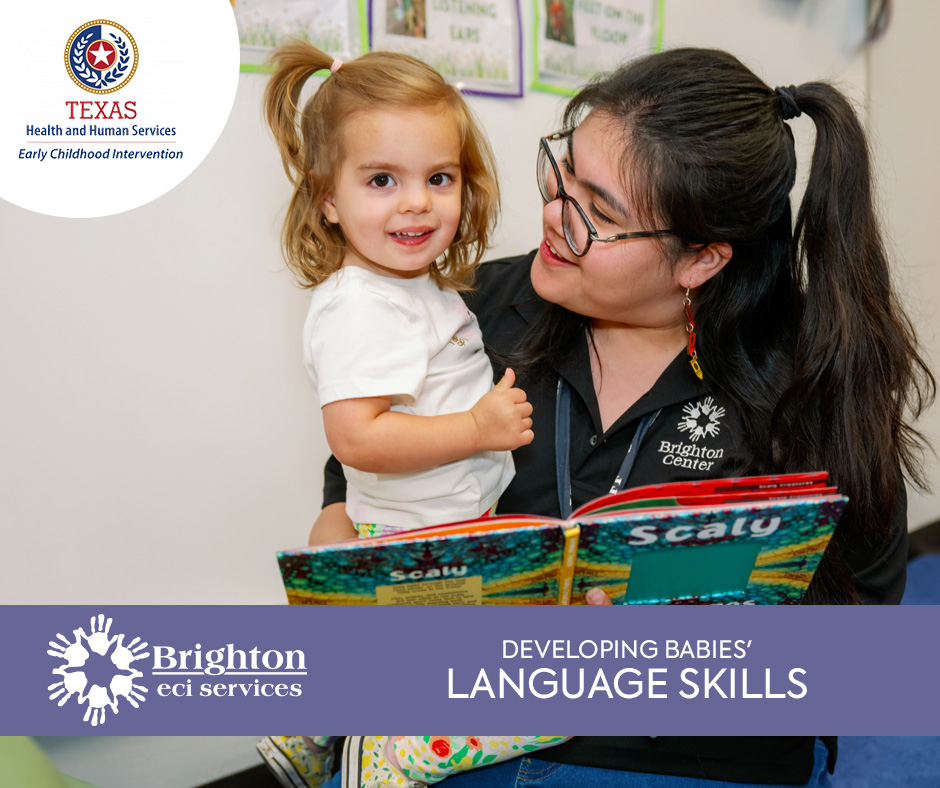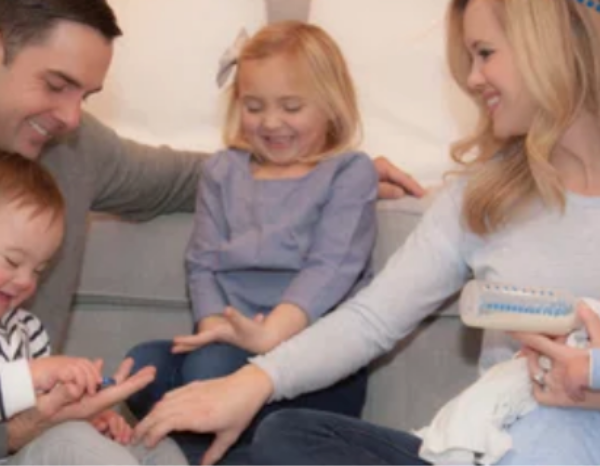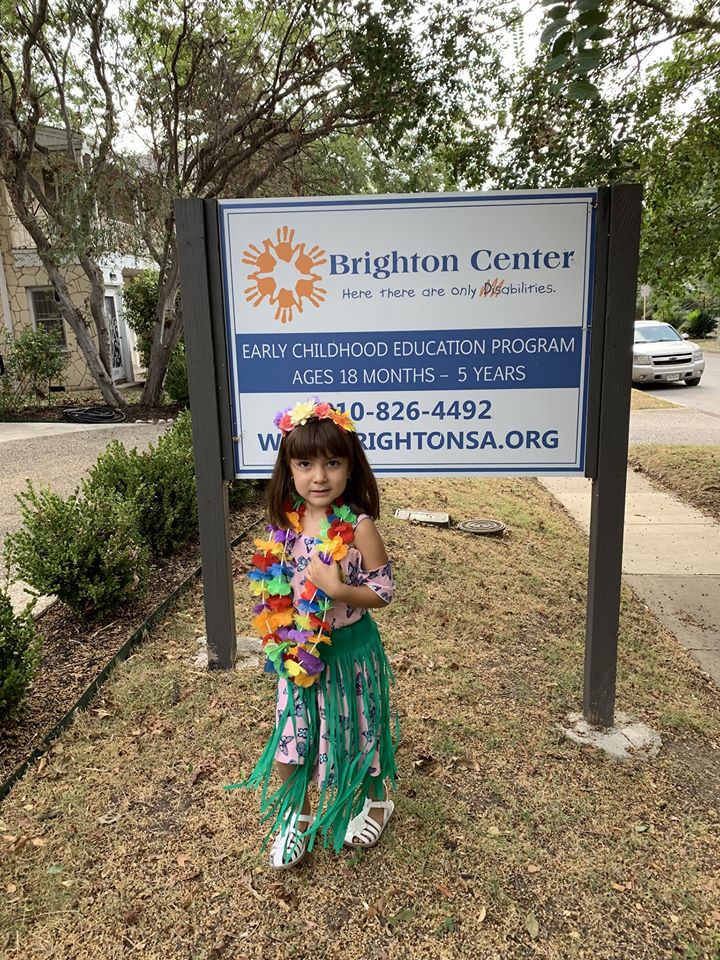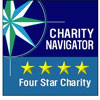Long before their first real words emerge, babies are already hard at work developing language skills from the moment they are born. The skills required for putting words together and speaking in full sentences start developing amazingly early. Those cute coos and ongoing babbles are babies’ first attempts at vocalization, and as a parent, it’s a joyous journey to witness and nurture.
Parents and caregivers play an invaluable role in nurturing these language skills through the warm, engaging, language-rich interactions you have with your little one every day. Here’s a look at how children’s language abilities progress in the critical first three years and what you can do to support their blossoming communication skills at each stage.
0-6 Months: Oohs, Ahhs, and Attentive Listening
 In the newborn days, your baby enjoys listening to the sounds, tones, and rhythms of the languages spoken around them. You can support this early auditory awareness by narrating your day, holding your baby close, and speaking in an exaggerated, melodic tone. For example, “Good moooorning! Time for a diiiaper change.” They’ll also engage you in some of their first “conversations” through dissolved cooing.
In the newborn days, your baby enjoys listening to the sounds, tones, and rhythms of the languages spoken around them. You can support this early auditory awareness by narrating your day, holding your baby close, and speaking in an exaggerated, melodic tone. For example, “Good moooorning! Time for a diiiaper change.” They’ll also engage you in some of their first “conversations” through dissolved cooing.
Babies learn through positive interaction, which is especially important in helping them develop language skills. Be sure to respond enthusiastically to any babbling attempts. In addition, maintain eye contact, smile, and reinforce their attempts by responding with a similar sound. Moreover, as babies begin to sit up and focus on objects, be attentive. Follow their gaze or point to items and narrate information about the objects, people, or activities they’re focused on. Consequently, this steady feedback helps make connections between sounds and meanings.
6-12 Months: First Words and Building Understanding
 Those highly anticipated first words like “mama,” “dada,” and “baba” start emerging toward the latter half of their first year. In fact, having heard language constantly, babies have sorted out the specific sounds used in the languages spoken to them. As a result, they’ll try to imitate them in strings of syllables that approximate real words.
Those highly anticipated first words like “mama,” “dada,” and “baba” start emerging toward the latter half of their first year. In fact, having heard language constantly, babies have sorted out the specific sounds used in the languages spoken to them. As a result, they’ll try to imitate them in strings of syllables that approximate real words.
You can help this next phase of their language skills development by continually repeating words for objects, people, and actions they’re interested in to reinforce the connection between sounds and meanings. In addition, books are incredible for building comprehension at this stage too. With their short attention spans, little ones this age love to look at bright colors on a board book and listen as their parents point to images and voice the characters on the page. Obviously, they won’t understand the elements of a story. Nevertheless, all that imaginary, back-and-forth interaction helps lay the foundation for conversational skills down the road. Not sure which books to read? Here’s an article that provides a list of seven great baby books.
Activities That Encourage Speech & Language Skills Development
Playtime during the toddler years is also an important social-emotional learning activity. During playtime, children practice their social skills and learn conflict resolution! Here are some tips for planning a good playdate.
Birth to 1 Year
- Respond when your baby laughs or makes faces. Make the same faces back to them.
- Teach your baby to do what you do, like clapping your hands and playing peek-a-boo.
- Point out colors and shapes.
1 – 2 Years
- Speak clearly to your child. Model good speech.
- Repeat what your child says to show that you understand. Add on to what they say. Use words like, “Want juice? I have juice. I have apple juice. Do you want apple juice?”
- Sing simple songs and say nursery rhymes. This helps your child learn the rhythm of speech.
2 – 3 Years
- Ask questions that include a choice. “Do you want an apple or an orange?” “Do you want to wear your red or blue shirt?”
- Help your child learn new words. Name body parts and talk about what you do with them. “This is my nose. I can smell flowers, brownies, and soap.”
- Cut out pictures of favorite or familiar things. Put them into categories, like things to ride on, eat, and play with.
12-24 Months: One Word at a Time
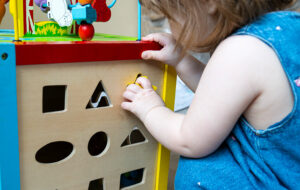 By 18 months, most toddlers are using words for familiar people or items, like “ball,” “cat,” and “dada.” They may also use one-word commands like “down,” “more,” and the ever-popular response, “no!” These first words mark the start of their journey into expressing themselves and getting their messages across.
By 18 months, most toddlers are using words for familiar people or items, like “ball,” “cat,” and “dada.” They may also use one-word commands like “down,” “more,” and the ever-popular response, “no!” These first words mark the start of their journey into expressing themselves and getting their messages across.
Developing the next level of language skills takes time. Help toddlers by speaking in simple one or two-word phrases. In addition, ask them to “show me the ____” and identify objects by name to reinforce comprehension. Narrate daily routines, so they keep associating words with objects and actions. Books focused on labeling pictures are ideal for building vocabulary. Encouraging imitation of you is great too, but don’t force it. The more words they hear in context from you, the more they’ll start putting together for themselves.
24-36 Months: Putting It All Together
By age two, the pace of language development kicks into high gear. Children at this stage love to communicate. Hence, they combine words into simple phrases and sentences like “Mommycome?” and “Want more milk.” Nevertheless, be patient, rephrase for clarity, and expand on their phrases to model fuller sentences: “You want more milk? Okay, here’s some more cold milk.”
 Encourage conversations by asking open-ended questions to build their expressive language skills and narrate experiences to grow their comprehension. Furthermore, make up silly songs and rhymes to play with language sounds. Moreover, point out words that start with the same letter to introduce letter-sound connections. Equally important – don’t stop reading! Books give children rich vocabulary and imaginary situations to spark curiosity and model more complex sentence structures.
Encourage conversations by asking open-ended questions to build their expressive language skills and narrate experiences to grow their comprehension. Furthermore, make up silly songs and rhymes to play with language sounds. Moreover, point out words that start with the same letter to introduce letter-sound connections. Equally important – don’t stop reading! Books give children rich vocabulary and imaginary situations to spark curiosity and model more complex sentence structures.
Speech and Language Development Delay
About 10 percent of young preschoolers may have a speech and language delay. Symptoms of this delay mean the child may not be able to:
- Say simple words like ‘mama’ or ‘dada’ clearly by 15 months.
- Understand simple words like ‘no’ or ‘stop’ by 18 months.
- Unable to talk in short sentences by 3 years old.
In most cases, these delays are temporary. In fact, with a little assistance from a speech therapist, many children can overcome these delays and be ready for school. If your child is not reaching these milestones however, consult your pediatrician and request an evaluation.
The most powerful thing you can do at every stage is to dive into your child’s point of view, follow their interests, and engage them in natural back-and-forth communication all day long. Babies are born wired to learn language through these warm, nurturing interactions with you. So, keep talking, singing, asking questions, and celebrating each attempt they make while developing these language skills!
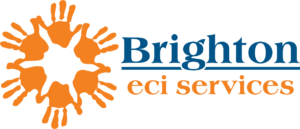 Brighton Center’s Early Childhood Intervention program helps children experiencing a developmental delay. Our Speech Language Pathologists (SLPs) help children develop language–the ability to give and to get information AND speech–the ability to verbally express language. SLPs evaluate and provide therapy for receptive and expressive language, sound development and clarity of speech as well as oral-motor abilities that contribute to effective sound production and swallowing. You can learn more about our services and request a free evaluation by contacting us here.
Brighton Center’s Early Childhood Intervention program helps children experiencing a developmental delay. Our Speech Language Pathologists (SLPs) help children develop language–the ability to give and to get information AND speech–the ability to verbally express language. SLPs evaluate and provide therapy for receptive and expressive language, sound development and clarity of speech as well as oral-motor abilities that contribute to effective sound production and swallowing. You can learn more about our services and request a free evaluation by contacting us here.
